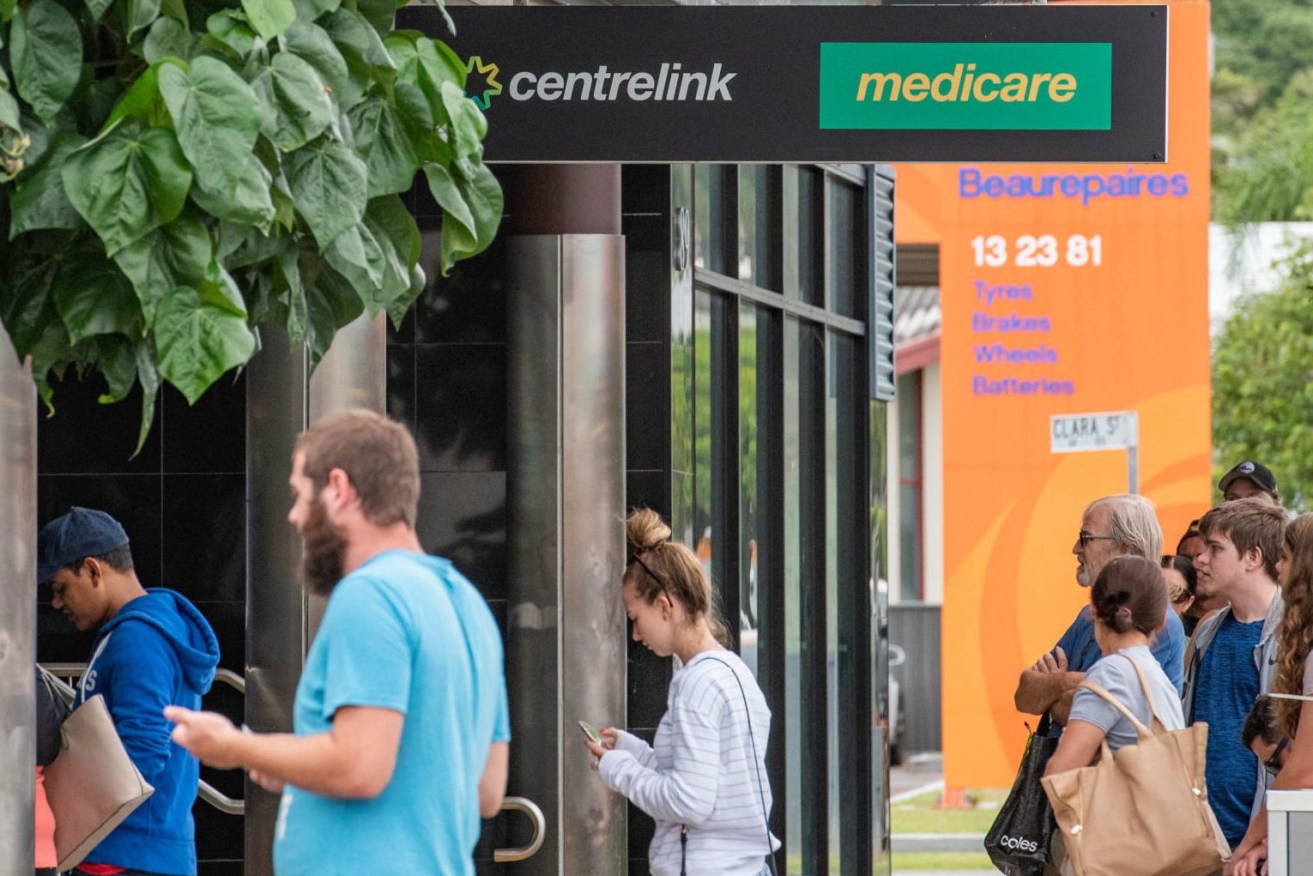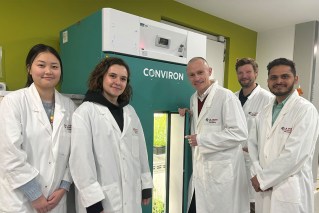How do we get a million Aussies off welfare and back to work? We need to start planning now
Whether it’s 10 weeks or 10 months, the coronavirus crisis will come to an end – but we must start planning now for what could be a very different economic future, writes Brian Roberts

Australians queue at Centrelink during the COVID-19 pandemic. (Photo by Florent Rols / SOPA Images/Sipa USA)
The coronavirus will have a profound impact on the future development of the Queensland and Australian economies.
The Federal government has established the National COVID-19 Coordination Commission in the adoption of a whole-of-society and whole-of-economy effort to ensure all resources are marshalled to this vital task in a coordinated and effective manner. This is crucial to ensure vital supply chains and resources are used efficiently and effectively to support the recovery effort.
However, the shockwave created by the crisis presents an even more challenging problem: How will we get more than a million Australians back to work after this immediate health crisis is over? We cannot assume things will return to normal. They won’t. The crisis will change every aspect of our lives, governance and economy.
We must start laying the foundations for the post-covid-19 society and economy – especially in Queensland. Parts of Queensland such as the Sunshine and Gold Coasts and Cairns regions will be struck very hard by the economic shock that is following on from the immediate health crisis, with 20% or more of their economies reliant on tourism, hospitality and leisure services.
An important lesson learned from disaster management is that crisis management must go hand in hand with post-disaster planning for recovery. The rebuilding of regional and local economies after any disaster takes time.
The Covid-19 has yet to work through many of the Asian economies where Chinese, Japanese and Korean manufacturing has been out-sourced in recent years. With so many of Australia’s regional economies tied into international economy and supply chains as the result of three decades of out-sourcing, especially in Asia, significant disruptions to these can be expected for several years.
Covid-19 will rewrite the economic model of development in Australia. If we are to recover quickly from this crisis, we need to start preparing immediately and start laying the foundations for a post-covid-19 economy. We cannot leave this until the crisis has passed before we start thinking about rebuilding state and local economies.
In many ways, the crisis will accelerate us towards what Klaus Schwab, founder and executive chairman of the World Economic Forum, has called the 4th Industrial revolution economy. It is not clear exactly what this economy will look like, or indeed if it will generate sustainable and equitable development outcomes and jobs for all. However, it will likely be more technological and knowledge driven. Hopefully, it will be more equitable, sustainable, collaborative and inclusive in the way it functions.
Most crises create opportunities for communities and individuals to be creative, innovative and take risks which they would not usually consider. This is already happening with local industries in Queensland producing spirits converting to the production of sanitation products and ventilators being produced by 3D printing.
The Economic analysis of the Spanish flu showed large and robust positive flow-on effects, during the post influenza epidemic phase, on per capita income growth across US states, leading to a period of resilience, job and wealth creation in the 1920s.
One of the most interesting reads on the effect of the Spanish flu on Queensland is a PhD thesis titled Flu, Society and the State: Political, Social and Economic Implications of the 1918-20 influenza Pandemic in Queensland. The post-pandemic era saw a period of economic, social and political resilience and change in Queensland until the Great Depression. The same spirit of creativeness and resilience which occurred in other parts of Australia.
Australia Needs New Strategies for Post-Covid-19 Economic Recovery
Long-term strategies are needed for national, state, regional and local economies if they are to recover quickly from this crisis. In preparing strategies, we must not be afraid of change or to do things differently. Many things will not go back to the way they were. We must learn from the experiences and innovation gained in doing things differently as we work our way through the crisis.
That said, there is a range of strategies which governments can consider immediately to support recovery from the crisis. Governments, with the assistance of economists and industry, investigate ways for re-shoring critical and competitive elements of industry supply chains to create more self-reliant/self-sufficient economy and jobs in Australia.
Some economists do not favour this; however, it is time to tear up many of the economic theories of trade based on comparative and competitive advantage. Reshoring and greater self-sufficiency in some sectors of the economy make sense when so many jobs are being lost. According to one non-profit organisation’s Data Report, nine-tenths of new manufacturing jobs generated in the US since 2010 resulted from re-shoring.
Australia has generally ignored re-shoring as an industry and job creation strategy, preferring to allow out-sourcing jobs and manufacturing investment to drift off-shore to Asia. Support for re-shoring offers a way for governments to create jobs quickly, particularly as disruptions to global supply chains will continue for some time. The crisis has already demonstrated that interruption to supply chains increases considerably with distance. Some Australian services companies are closing off-shore call centres to create re-shored jobs .
In association with re-shoring, more companies are recognising the advantages of shortening supply chains to reduces transport cost and disruption risk. The current crisis will likely hasten the trend to shortening its supply chains; however, policy reform is necessary to reduce regional business and government transaction costs, improve logistics management systems and the utilisation and efficiency of existing local and regional networks of infrastructure and services.
Building regional local area networks in Queensland and other parts of Australia are crucial to enhancing connectivity and pooling of common-user infrastructure, capital and resources sharing arrangements between provincial local governments to overcome economies of scale, enhance competitiveness and develop sub-national markets. They are also crucial to reducing localised economic, social and environmental risks.
Many businesses recognise the advantages of collaboration in working more closely to share resources, co-produce and co-purchase goods and services to help reduce transaction costs, improve efficiencies and competitiveness, in an economic model based on collaborative advantage. Governments and business in Australia have been slow to embrace the model of collaborative governance, especially within systems of cities and regional areas.
The first principle of post-disaster planning should start with people within their local communities. The recent bushfires demonstrated and, ironically, prepared us better to handle this crisis than many other countries. It does, however, require national and state level governments to provide the framework and contribute the resources, hard and soft infrastructure needed to rebuild disaster-hit economies.
Home Grown Model Needed for the Post-covid-19 Economy
The current crisis will pass but result in many job losses in Queensland and other parts of our nation. We need both a national and state framework to rebuild what will be a changing economy. To fill the job void, strategies are required to bring jobs home and to create local employment. The current crisis should be used to develop e-based knowledge to acquire new skills and expertise to these ends. The localisation and glocalization of innovation, creativity and learning will be important to achieve these two outcomes. We will also need to embrace more significant use of AI, 3-D printing, co-production and adopt collaborative governance as a standard management model.
The old economic models of development based on Australia focusing on exports, and every state, city and region competing to grow their economies independently, may finally be over. We have reached a state where we have become too dependent on imports to meet our supply chain and consumer needs. Already, China is moving to develop a more self-reliant economy. We must follow.
We should not allow our country, states and regions to become so reliant on global supply chains to support many of our industry and consumer needs. We need a more balanced, self-sufficient and sustainable model of national, regional and local development based on collaborative advantage and collaboration between firms and regions to create new jobs, smarter cities and regions and greater equity between the haves and have nots.
We need to start a National and state government conversation on what type of national, state and regional economies we want after we get out of this crisis. Once we have a picture of what that might be, it should be up to communities to decide how to build the infrastructure and resources to realise a better future and decent jobs for all. We cannot leave the discussion and planning for the post-covid-19 economy until the crisis is over.
Brian H Roberts is an Emeritus Professor of Urban Management at the University of Canberra, and Director of Urban Frontiers, Brisbane. He is an international advisor on urban and regional economic development and management to the UN, several international development banks and APEC. He has work on several disaster recovery programs including Aceh and Northern Sri Lanka.












